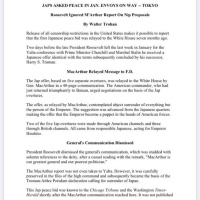
Scrutiny (French: scrutin; Late Latin: scrutinium; from scrutari, meaning "those who search through piles of rubbish in the hope of finding something of value" and originally from the Latin "scruta," meaning "broken things, rags, or rubbish."). In Roman times, the "scrutari" of cities and towns were those who laboriously searched for valuables amidst the waste and cast-offs of others. The modern English "scrutiny" is derived from this root, indicating a careful examination or inquiry (often implying the search for a hidden mistake, misstatement, or incongruity).
It is hard to imagine a more succinct description of the meeting that took place, this past Thursday, in Israel. Some forty heads of state or state representatives—Vice-President Mike Pence and Speaker of the House Nancy Pelosi; Prince Charles; Presidents Vladimir Putin, of Russia, Emmanuel Macron, of France, and Frank-Walter Steinmeier, of Germany (though, significantly, not Andrzej Duda, of Poland)—travelled to Jerusalem to attend the commemoration of the seventy-fifth anniversary of the liberation of the Auschwitz-Birkenau camp, and to participate in the fifth World Holocaust Forum, hosted by Yad Vashem, Jerusalem’s Holocaust museum and historical institute. The Israeli President, Reuven Rivlin, speaking at a welcoming reception on Wednesday evening, said, “Tomorrow we will gather to remember and to promise: Never again!” Ilona would not have doubted Rivlin’s sincerity or his erudition, yet she grasped that, for anyone born at a distance from, or after, the war’s atrocities, the claim “to remember”—to present oneself as scarred—is to engage in a kind of anachronistic moral positioning. For liberal writers and politicians, “to remember” is a cue to invoke the supreme cruelty of the Holocaust and to commit to institutions that promote tolerance. But, for nationalist writers and politicians, “to remember” is also an opportunity to appropriate moral prestige, adding to their distinction or shielding their cause from scrutiny.

























